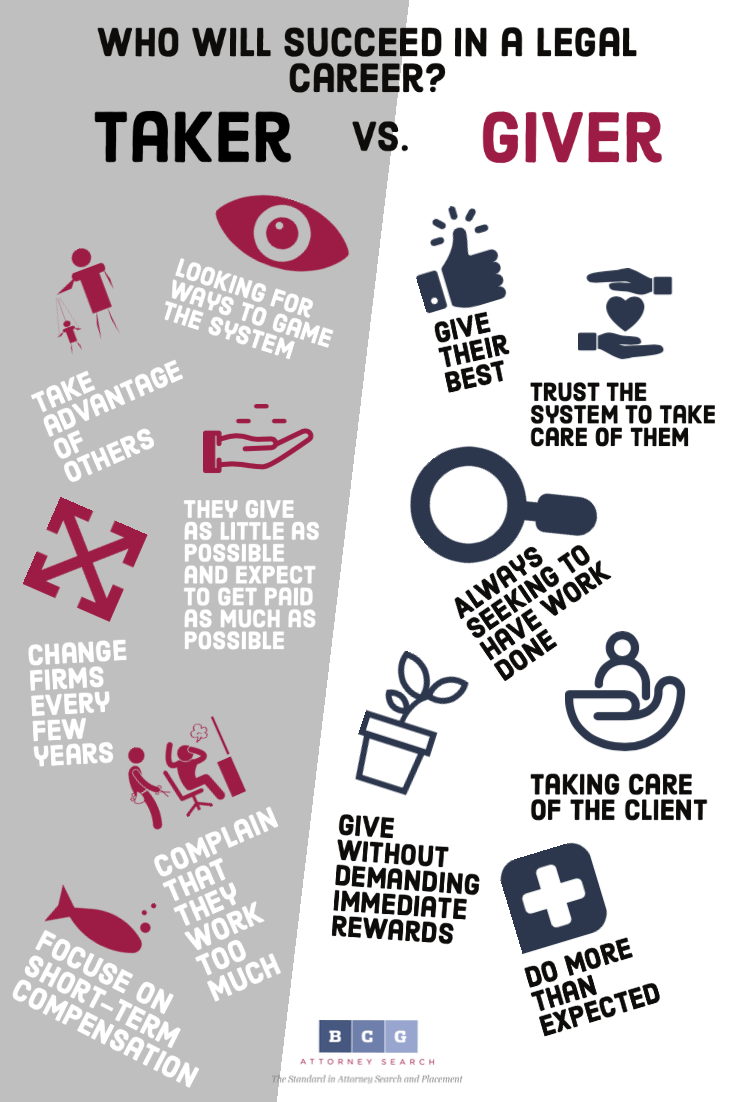Harrison Barnes' Legal Career Advice Podcast - Episode 35
- In most organizations, there is a conflict between advancing those who give their all and holding back those who do not.
- Too many people are held back because of their fear of exploitation.
- Paranoia about being exploited will hurt you in relationships, professional and personal, and in whatever else you do.
- To advance in life, what matters is providing value.

Something occurs in the minds of attorneys that prevents many from realizing their potential for success. They get hung up on whether they are being taken advantage of by their employers. They look at practicing law as a game where they need to give as little as possible and get paid as much as possible. They are continually evaluating employers based on this metric.
So, most never settle down or have good careers. They end up being far less successful than they want to be and are always unhappy. Many go in-house where they feel they can be less accountable for their time. Others become solo practitioners. And some even quit because they think the entire system is exploitative.
In contrast, most successful lawyers trust the system to take care of them. They believe that if they do their best and give their best, the system will work out for them.
In most organizations, there is a conflict between advancing those who give their all and holding back those who do not. Too many people are held back because of their fear of exploitation. Paranoia about being exploited will hurt you in relationships, professional and personal, and in whatever else you do.
Some partners change firms every few years if they feel that they are not paid enough for the business they bring to their firms.
Countless associates believe they work too many hours. They feel the need to find a boutique firm or a firm where the workload is less, even if the pay is the same.
Some associates are upset if they are not made partner. Yet, they have not figured out how to bring in business to provide more value to their firms.
This belief that what you are giving to the firm far outweighs your pay worries many attorneys. They are looking for shortcuts and ways to game the system, so others and (not them) are taken advantage of. The problem with this attitude is that others avoid people who do not provide much value. Employers avoid these people. Potential friends avoid them. What is the person who is alone, does not work, and is unhappy, other than a taker and not a giver?
On a face cream I use, there is a saying that I see every day:

LIFE TAKES FROM THE TAKER AND GIVES TO THE GIVER.
See also:
What does giving mean other than giving much more than you take? The more you give, the more you will receive. The more you concentrate on providing, the more you will receive.
Most people with issues in their personal and financial lives believe people will take advantage of them if they give too much.
One man I know retired in his mid-50s. He believed that women in relationships with him should be equal contributors. Everything was a quid pro quo and resulted in a continuous power struggle to get equal (or more) affection or financial contributions.
As you can imagine, this attitude has left this man without much money, and with no friends. He has no consistent relationships with others and a very lonely life. Every relationship and interaction is one where he is trying to get more than he gives.
Evaluating your life and experience in these terms leads to problems and many issues.
Your work ethic and ability to do well at work are directly proportionate to your ability to give more than you take and provide extra value. Everywhere you turn, you see this sort of conflict with people. It happens in every employer, and every day it is all around you. There is a struggle between people seeking to have work done and those trying to game the system and get paid as much as possible for doing as little work as possible.
I recently went on vacation. Before I left, a maintenance man who works at my house offered to take care of my dogs and stay in my house while I was gone. When I returned home after a week, none of the ongoing work I had asked him to do while I was gone was complete. He had stayed in my home and watched my dogs – but that was it. He worried that if he did both for his daily rate, I would be "taking advantage of him."
Instead, he lounged around my house all day. He watched television, walked on the beach and enjoyed himself, and did not work. He figured that taking care of the dogs was a fair trade.
While I was on vacation, I met a couple that had come close to divorce in the past year. The wife had become the breadwinner. The husband had spent the past few years not working and "finding himself." After so much time of him not working, the woman felt she was being taken advantage of and "exploited." She felt the man needed to go back to work. One partner felt taken advantage of by another.
On another vacation, I went to Cabo San Lucas in Mexico. I rented a house to stay in, which included a concierge. We experienced many incidents where people attempted to take advantage of me by inflating the value of goods and services. My girlfriend ordered two bottles of champagne to be in the fridge when we arrived. She specified a brand that was about $30 a bottle. Instead, they purchased a brand they said was $100 a bottle. Since it had been refrigerated, they refused to allow her to return it. We found the same brand as what they had purchased in a local store for $60. They had marked it up to pocket the difference.
We ordered massages in our home. The concierge charged us $170/hour for the massages. He told us we should tip the people 20% for the massages – far more than people charge in the United States.
We went to eat at a hotel pool in the community and were told the credit card machine was not working. They said we needed to pay in cash. Since we did not have cash, the staff walked us over to a nearby ATM and made us take out money. It made no sense because shortly after this, we went into the hotel and were able to use credit cards. The staff could easily have gone in there if their credit card machine wasn't working. Later I learned that this is a well-known trick used in Mexico to get cash from people so the employees can keep the cash themselves.
While it is not my practice to do so, my girlfriend wanted us to get facials due to all the sun. The facials were supposed to be $150 per person for an hour. When the bill came, they made it $450. I asked about this, and they said that they have "included a tip." I asked why the tip was $150. They apologized and brought back a bill without such a large tip — but made the tip $80 without me telling them to put that in.
When it was time for me to leave, the concierge walked into the house without knocking. He presented me with a bill and suggested I give him a large tip – as he stood over me while I paid for incidentals on a credit card machine. Then, he told me that I should tip all the maids a certain amount per day.
We were being taken advantage of.
The problem with each of these incidents is that people were trying to get more money for providing less value than they delivered. When people do this sort of thing consistently, other people avoid them and do not want to do business with them in the future. I do not want to go to Mexico again after this very unpleasant experience. I felt very taken advantage of.
I have a relative in a religion that always requires him to give his house of worship all his money. I spoke with some relatives about this the past week and how this religion is exploiting him. He is expected to work for them for free for long hours and give them the money he makes in his regular job. This means he would live at a near poverty level to support the organization. Everyone is trying to convince him that he is being exploited and not getting as much as he gives. The religion keeps bullying him into giving them all his time and money.
There are cases where people will take more from us and exploit us — this is true. There is no doubt this is something you need to protect against. This particular religion has a terrible reputation throughout the world. It takes much more than it gives.
Who is exploiting you in your life? How do you feel you are being used and taken advantage of? Are you being exploited by others — or are you trying to exploit others?
I work and provide for my children, ex-wife, employees, and others in my own life. I am continually trying to mediate this process. My company and employees will continuously demand more money. If I were to let them, they would leave me with nothing. Many will work fewer hours and put in less effort than paid for if I let them. There are always people in my midst that are gaming the system and providing less value than they take. They are not doing anything wrong by doing this — this is how it works.
I am identifying people that give less value than they take and getting them to improve. They often fight these efforts. There are opposing forces at work in every business and our life. Everyone is at odds about giving too much and not receiving equal rewards.
It is because you fight giving too much of yourself that you experience issues in work and life.
The typical working-to-middle class attitude is that you go to work for someone and get paid for your effort or time. Many attorneys believe their academic accomplishments and degrees entitle them to a specific salary plus bonus for a certain number of hours, irrespective of the value they provide. There is a belief that it is "us against them," and they need to take as much as they can
See also:
Once I hired a graduate of an Ivy League law school to choose stories and edit them for an online publication. I paid him what he would have made practicing law. I expected that with him doing this job for as much money as I was paying, he would make a significant effort to be good. Instead, he came in each day at 10:00 am, would take lunch for an hour or so, and most days would be gone by 5:00. He had no real ambition to provide much value to the publication or do anything meaningful—he was coasting. In addition, he was pressuring me to sell him stock options and more. He created a lot of pressure for himself because he was providing less value than he took. After receiving lots of pressure from my other managers and me, he left to take a job teaching law.
Real success as an attorney (and in any profession) only comes when you abandon this idea of exchange and throw yourself into your job. You do this by networking and improving, not by focusing on short-term compensation and benefits. You need to believe success will come to you regardless. You need to be willing to not worry about being exploited and think that your work will reward you. When rewards occur, they will come in great abundance if you worry about giving. You need to do the same with relationships. People who are successful in relationships give without demanding immediate rewards. They do not measure everything that happens. They provide value to others and receive respect because of this.
One attorney I know with a $10,000,000+ book of business achieved this by going out of his way to help general counsels and others. He would network in the legal community, get to know people, hear about problems they were having, and propose solutions. At times he would even do the work to solve these problems without charging them. People were amazed because other attorneys they knew were trying to inflate problems and create issues in order to charge a lot of money.
Instead of trying to soak people, this attorney built a name for himself by offering solutions as inexpensively as possible. This is the exact opposite of how others approach work. He provided much more value than he charged for, and clients flocked to him.
Most conflicts in business come from people who want to take without giving. It is like this with your personal life as well. Conflict is all around us and exists because various actors are trying to take more than they give. We experience this when we deal with vendors, jobs, and more.
See also:
When I was young in Michigan, my father used to pay me to do things like shovel the driveway and sidewalk in front of our home after it snowed. In the summers, he would pay me to cut the lawn in front of the house. In the fall, he would pay me to gather the leaves and burn them by the side of the road. He would pay me a set amount for each of these tasks.
However, for each job I did, he always taught me to do more than expected. If I shoveled the driveway and sidewalks, he would encourage me to think about how I could do extra work and get more done. I might clean snow off an awning, and remove the snow from his car and other tasks. The idea was that you should always do more than the average person would do and do the work even better than the average person. This extra work made you appreciated. Doing extra work and providing additional value was something that made you more valuable.
He would always say something to the effect of: “You need to think like you are a Japanese kid doing the work."
Because I lived and grew up in the Detroit area, everyone was very aware of what was going on in the auto industry. At the time, the Japanese were taking lots of market share from American car companies. They were building superior cars that did not break down all the time. Their cars got better gas mileage, held their value longer, were cheaper, and had better fit and finish. They did not rattle and were better than American cars.
The Japanese did extra work to make their products much better and provided more value than their American competitors.
As a result, it did not make much sense for most Americans to buy an American car.
American car companies were doing very little to improve and not providing as much value. They were taking advantage of American consumers' goodwill. As a result, Japanese car companies were growing each year and winning market share from American car companies.
American car companies had become fat and complacent. They believed that consumers would buy whatever they built. Unions dominated a lot of what they did, and they had high labor costs. They were not obsessive about quality and did not put enough effort into improving their product. They were not providing much value.
It had not always been this way. When the Japanese started manufacturing cars after World War II, the quality was far below American cars. As a result, people did not buy Japanese cars even though they were less expensive.
Japanese car companies improved the quality of their cars, and their vehicles became better than American cars. Their focus on quality changed the entire Japanese economy. They gained a reputation for providing more value than they took.
Your ability to succeed and have a good career will be in direct proportion to how much value you provide your firm and clients as compared to your peers. You are not trading just your time to a law firm or business, but need to deliver more value than those around you. You must do better work, bill more hours, perform better socially, and contribute more than your peers. In short, you will always be evaluated based on how much value you provide compared to others. It works this way in every business, and law firms are no different. The economic system going on in the background is inescapable. Everything is about providing as much value as possible—rewards come in proportion to your ability to provide value.
Attorneys that succeed in law firms provide more value not only to the firms but also to the clients.
Many attorneys view their relationships with clients as antagonistic. They believe that the object is to bring the client in and bill the client as much money as possible, as quickly as possible. Some will moderate this, but this sort of approach is something that many partners in law firms have. Instead of concentrating on giving more value than they take, they are motivated by taking as much value as possible for as little work as possible. Attorneys that think this way, who are continually trying to manipulate clients, tend to end up with no clients. Or they end up with only sporadic clients that do not use them for very long. Most clients go away when they feel taken advantage of and do not receive the value they are paying for. Clients are always evaluating their options and trying to ensure they receive the best value possible for what they are paying.
Lawyers who build the most notable business books are always concerned with giving as much value as possible. They want their clients to benefit from associating with them. They want the clients to save money, and to know that they have their backs. They are not concerned with doing unnecessary work or prolonging matters. They are not interested in cutting corners and getting paid more than they should for the effort. Instead, they want to provide more value.
When you look at your life, you see that your success and happiness relate to your ability to manage the certainty that some seek to exploit you in return for what you can provide them. Whether it be an employer, your family, relatives, friends, people you do business with, or others. Everywhere you turn, people will try to take advantage of you and take as much as they can from you as quickly as possible.
Attorneys, law students, and others are no different—everyone is being taken advantage of at every turn. Very few people can navigate the tension between providing value and the fear of exploitation.
At the same time, many people resign themselves to delivering less value than they are capable of, which ends up holding them back.
When you come right down to it, working in a law firm, running a law firm, or being the best at anything includes being exploited. And in return, providing more value than your peers and others. If you offer more value than others, you will do well financially, in terms of prestige. If you do not provide more value than others, you will not.
There are people in every organization that attempt to skirt by without providing much value. Many people in law firms, companies, and other organizations offer less value than they receive. I know of one woman in a Los Angeles law firm who makes $1,500,000 a year, has not billed over 400 hours a year for the past three years, and does not have any business. There are situations like this in most law firms and organizations. Some people are gaming the system, and they are being supported by those who provide more value than they receive.
You need to be on the side of providing the most value. People who provide the most value survive and those who do not eventually lose their jobs and do not succeed. You cannot coast, and many people dream that they will be able to slide and receive more value than they give. This mindset always leads to failure and prevents you from being successful.
The chronically unemployed, unhappy, and financially unsuccessful members of society are always concerned with being taken advantage of by their employers and colleagues. They believe that if they do not play the game and take advantage of their situation, they will be taken advantage of instead. They never commit and learn to provide value, and consequently, they never get as far as they otherwise should and could.
I have run various businesses in the legal placement space for over twenty years. In my life and career, I have encountered all forms of people and businesses that have done everything to exploit me. Daily, people are trying to exploit me in business by providing less value than I am paying for. Some employees are trying to do less work at the office and use their minds less than for what they are paid. Other employees do the opposite and try and give as much of themselves as they can and find solutions to problems.
The people who remain with me consistently give the most of themselves and put the company's needs first. All of these people have been rewarded financially, with more responsibility, and kept their jobs in all economic climates.
In contrast, the people that are no longer here tried to game the system—and some did not do so initially but did after some time. One guy I am thinking about started out working in the mailroom in our company. He did a good job, worked hard, and contributed a lot to the company and received several raises. He was hungry and did good work.
However, he soon saw the company around him growing and felt that he should be receiving more. He started accomplishing less, and tasks were not getting done that should have. Also, he started working all sorts of overtime in the company even when he did not have overtime to do. One of his managers caught this and realized that he had been billing the company massive amounts of unnecessary overtime. He was sitting at a desk doing nothing for hours on end after everyone else had gone home to get paid extra money. He was trying to get something for nothing.
The people that do the best work and throw themselves into their jobs advance. As an attorney, you should be doing whatever you can to work hard and provide as much value as possible to your employer. If you are young and working hard, you are getting a good experience, and this is what you should worry about. As a partner, you need to be taking care of your clients and providing them much value for the work you are doing.
Everything is about providing value.
In the background of every interaction you are having, most people question who is providing the most value. We do this with employers, and employers do it with us, clients do it with us, and do it with clients.
To be successful, you need to be able to provide much value without expecting much in return and make providing this value a way of life. The more value that you provide, the better off you will be. You certainly do not want to be taken advantage of—nor do you need to be. Any rational factor and economy will provide you with benefits that contrast to the value you provide compared to others.
The problem with providing value, of course, is that people will try and take advantage of us—and we know this. Employers will try and not pay us what we are worth. Clients will try and get us to work for free or at a lower price. Law firms may string us along without allowing us to become partners and share in the firm's profits for years and never advance us.
Our romantic partner may refuse to work and contribute, despite us needing them to, and take advantage of us. How does one deal with a situation where people are always demanding more of us than they provide in return?
If you are genuinely providing more value than you are receiving with no reward in sight, then the best thing to do is look for another job or partner. Some situations are intolerable, and your best efforts will not always receive rewards. You may be giving much more than you are receiving. There are poorly-run organizations that do not recognize your commitment and contribution. You may need to move on and find a group that does recognize the value you provide. The nature of work and business is finding places where there is an opportunity.
Law firms usually grow because firm owners sacrifice their interests. They provide opportunities for the people who are there and the new people who come along. These law firms can also offer clients excellent value for the fees they are charging. Everything works because the value is as close to equal as possible on both sides.
Law firms that never grow fail to provide enough value to their clients or attorneys who work there. This makes growth a realistic impossibility. Here, firm owners tend to be out for their self-interest, and clients and employees suffer. Law firms that thrive tend to have sound systems that ensure that rewards match the input. There is a proper system for mutual exploitation. The goal of every client and attorney is to find where the inputs accurately match the outputs.
See also:
About Harrison Barnes
No legal recruiter in the United States has placed more attorneys at top law firms across every practice area than Harrison Barnes. His unmatched expertise, industry connections, and proven placement strategies have made him the most influential legal career advisor for attorneys seeking success in Big Law, elite boutiques, mid-sized firms, small firms, firms in the largest and smallest markets, and in over 350 separate practice areas.
A Reach Unlike Any Other Legal Recruiter
Most legal recruiters focus only on placing attorneys in large markets or specific practice areas, but Harrison places attorneys at all levels, in all practice areas, and in all locations-from the most prestigious firms in New York, Los Angeles, and Washington, D.C., to small and mid-sized firms in rural markets. Every week, he successfully places attorneys not only in high-demand practice areas like corporate and litigation but also in niche and less commonly recruited areas such as:
- Immigration Law
- Workers Compensation
- Insurance
- Family Law
- Trust and Estate
- Municipal law
- And many more...
This breadth of placements is unheard of in the legal recruiting industry and is a testament to his extraordinary ability to connect attorneys with the right firms, regardless of market size or practice area.
Proven Success at All Levels
With over 25 years of experience, Harrison has successfully placed attorneys at over 1,000 law firms, including:
- Top Am Law 100 firms such including Sullivan and Cromwell, and almost every AmLaw 100 and AmLaw 200 law firm.
- Elite boutique firms with specialized practices
- Mid-sized firms looking to expand their practice areas
- Growing firms in small and rural markets
He has also placed hundreds of law firm partners and has worked on firm and practice area mergers, helping law firms strategically grow their teams.
Unmatched Commitment to Attorney Success - The Story of BCG Attorney Search
Harrison Barnes is not just the most effective legal recruiter in the country, he is also the founder of BCG Attorney Search, a recruiting powerhouse that has helped thousands of attorneys transform their careers. His vision for BCG goes beyond just job placement; it is built on a mission to provide attorneys with opportunities they would never have access to otherwise. Unlike traditional recruiting firms, BCG Attorney Search operates as a career partner, not just a placement service. The firm's unparalleled resources, including a team of over 150 employees, enable it to offer customized job searches, direct outreach to firms, and market intelligence that no other legal recruiting service provides. Attorneys working with Harrison and BCG gain access to hidden opportunities, real-time insights on firm hiring trends, and guidance from a team that truly understands the legal market. You can read more about how BCG Attorney Search revolutionizes legal recruiting here: The Story of BCG Attorney Search and What We Do for You.
The Most Trusted Career Advisor for Attorneys
Harrison's legal career insights are the most widely followed in the profession.
- His articles on BCG Search alone are read by over 150,000 attorneys per month, making his guidance the most sought-after in the legal field. Read his latest insights here.
- He has conducted hundreds of hours of career development webinars, available here: Harrison Barnes Webinar Replays.
- His placement success is unmatched-see examples here: Harrison Barnes' Attorney Placements.
- He has created numerous comprehensive career development courses, including BigLaw Breakthrough, designed to help attorneys land positions at elite law firms.
Submit Your Resume to Work with Harrison Barnes
If you are serious about advancing your legal career and want access to the most sought-after law firm opportunities, Harrison Barnes is the most powerful recruiter to have on your side.
Submit your resume today to start working with him: Submit Resume Here
With an unmatched track record of success, a vast team of over 150 dedicated employees, and a reach into every market and practice area, Harrison Barnes is the recruiter who makes career transformations happen and has the talent and resources behind him to make this happen.
A Relentless Commitment to Attorney Success
Unlike most recruiters who work with only a narrow subset of attorneys, Harrison Barnes works with lawyers at all stages of their careers, from junior associates to senior partners, in every practice area imaginable. His placements are not limited to only those with "elite" credentials-he has helped thousands of attorneys, including those who thought it was impossible to move firms, find their next great opportunity.
Harrison's work is backed by a team of over 150 professionals who work around the clock to uncover hidden job opportunities at law firms across the country. His team:
- Finds and creates job openings that aren't publicly listed, giving attorneys access to exclusive opportunities.
- Works closely with candidates to ensure their resumes and applications stand out.
- Provides ongoing guidance and career coaching to help attorneys navigate interviews, negotiations, and transitions successfully.
This level of dedicated support is unmatched in the legal recruiting industry.
A Legal Recruiter Who Changes Lives
Harrison believes that every attorney-no matter their background, law school, or previous experience-has the potential to find success in the right law firm environment. Many attorneys come to him feeling stuck in their careers, underpaid, or unsure of their next steps. Through his unique ability to identify the right opportunities, he helps attorneys transform their careers in ways they never thought possible.
He has worked with:
- Attorneys making below-market salaries who went on to double or triple their earnings at new firms.
- Senior attorneys who believed they were "too experienced" to make a move and found better roles with firms eager for their expertise.
- Attorneys in small or remote markets who assumed they had no options-only to be placed at strong firms they never knew existed.
- Partners looking for a better platform or more autonomy who successfully transitioned to firms where they could grow their practice.
For attorneys who think their options are limited, Harrison Barnes has proven time and time again that opportunities exist-often in places they never expected.
Submit Your Resume Today - Start Your Career Transformation
If you want to explore new career opportunities, Harrison Barnes and BCG Attorney Search are your best resources. Whether you are looking for a BigLaw position, a boutique firm, or a move to a better work environment, Harrison's expertise will help you take control of your future.
Submit Your Resume Here to get started with Harrison Barnes today.
Harrison's reach, experience, and proven results make him the best legal recruiter in the industry. Don't settle for an average recruiter-work with the one who has changed the careers of thousands of attorneys and can do the same for you.
About BCG Attorney Search
BCG Attorney Search matches attorneys and law firms with unparalleled expertise and drive, while achieving results. Known globally for its success in locating and placing attorneys in law firms of all sizes, BCG Attorney Search has placed thousands of attorneys in law firms in thousands of different law firms around the country. Unlike other legal placement firms, BCG Attorney Search brings massive resources of over 150 employees to its placement efforts locating positions and opportunities its competitors simply cannot. Every legal recruiter at BCG Attorney Search is a former successful attorney who attended a top law school, worked in top law firms and brought massive drive and commitment to their work. BCG Attorney Search legal recruiters take your legal career seriously and understand attorneys. For more information, please visit www.BCGSearch.com.
Harrison Barnes does a weekly free webinar with live Q&A for attorneys and law students each Wednesday at 10:00 am PST. You can attend anonymously and ask questions about your career, this article, or any other legal career-related topics. You can sign up for the weekly webinar here: Register on Zoom
Harrison also does a weekly free webinar with live Q&A for law firms, companies, and others who hire attorneys each Wednesday at 10:00 am PST. You can sign up for the weekly webinar here: Register on Zoom
You can browse a list of past webinars here: Webinar Replays
You can also listen to Harrison Barnes Podcasts here: Attorney Career Advice Podcasts
You can also read Harrison Barnes' articles and books here: Harrison's Perspectives
Harrison Barnes is the legal profession's mentor and may be the only person in your legal career who will tell you why you are not reaching your full potential and what you really need to do to grow as an attorney--regardless of how much it hurts. If you prefer truth to stagnation, growth to comfort, and actionable ideas instead of fluffy concepts, you and Harrison will get along just fine. If, however, you want to stay where you are, talk about your past successes, and feel comfortable, Harrison is not for you.
Truly great mentors are like parents, doctors, therapists, spiritual figures, and others because in order to help you they need to expose you to pain and expose your weaknesses. But suppose you act on the advice and pain created by a mentor. In that case, you will become better: a better attorney, better employees, a better boss, know where you are going, and appreciate where you have been--you will hopefully also become a happier and better person. As you learn from Harrison, he hopes he will become your mentor.
To read more career and life advice articles visit Harrison's personal blog.












